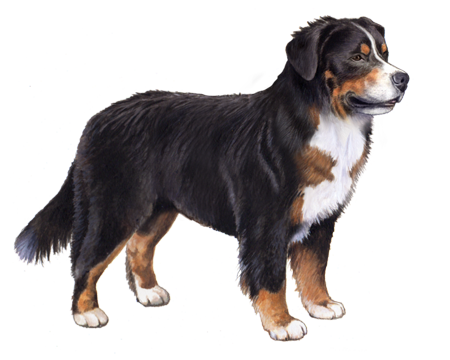
Bernese Mountain Dog
This large breed is intelligent, strong, self-confident, and generally easygoing. They bond strongly to their people, and they don’t do well when they are left alone for long periods of time. Although Bernese Mountain Dogs—or Berners—are protective and may be aloof with strangers, they aren’t necessarily shy, and they don’t tend to be aggressive.
Interested in discovering if your dog is a Bernese Mountain Dog?
Check out Wisdom Panel's DNA tests.

Bernese Mountain Dog Traits
General Appearance
This large, striking breed is sturdy and strong, and despite its size, moves quickly with agility. The Berner has dark brown, friendly eyes and a thick, long tri-colored coat of black, rust, and white.
Coat and Colouring
The Bernese Mountain Dog has a long, glorious coat that is thick with a natural, bright sheen. They are tricolored, with a base coat of black and markings that are clear white and rust.
Distinctive Physical Traits
The Bernese Mountain Dog’s large size is its most distinguishing characteristic. They have full, muscular bodies.
Bernese Mountain Dog Temperament
These large-breed dogs do best in bigger homes, with plenty of outdoor space to roam. They bond strongly to their owners, and they don’t do well when left alone for long periods of time. While they don’t tend to be aggressive, they can be aloof with strangers, and proper training and socialization is very important.
Because of their heavy coat, Berners loves snow and the cold weather, but they are also susceptible to heat stroke for the same reasons and shouldn’t be kept in warm or hot climates. The Bernese Mountain Dog doesn’t tend to bark, but is known to dig, so any fencing should be extra secure.
The Bernese Mountain Dog is a versatile, loving breed that enjoys dog activities like agility, tracking and herding. They are gentle and good-natured with their people, but they can be aloof with strangers and their large size means they should always be supervised with small children. They don’t tend to bark a lot, but they don’t do well when they’re left alone. They can be protective—though not usually aggressive—and are known to dig.


Bernese Mountain Dog History
The Bernese Mountain Dog was bred as an all-purpose dog in the Bern agricultural region of Switzerland. They were working dogs who were kept busy guarding the farms, driving cattle, and providing companionship. As drafting dogs, they could pull multiple times their own weight due to their strength and fortitude.
As the breed began to dwindle in the 1800s, Swiss fans of the dog took it upon themselves to help the Bernese Mountain Dog make a comeback. A Swiss breed club was formed in 1907, led by Professor Albert Heim. The breed made its debut in America in 1926 in Kansas. Although imported as farm dogs, their usefulness and sweet temper popularized them, and in 1937 the breed was registered with the American Kennel Club.
Bernese Mountain Dog Care
Nutrition
Bernese Mountain Dogs require a high-quality dog food that is age-appropriate—whether it’s commercially manufactured or homemade (with a veterinarian’s supervision and approval). It’s important to monitor the amount of food you give your Bernese Mountain Dog. Reduce the portions or restrict calories if your pup gains weight. Your veterinarian is always a good source to help provide you with appropriate nutrition and feeding guidelines.
Grooming
The Bernese Mountain Dog has a double coat that sheds frequently and requires a fair bit of care. Weekly brushing should be fine on average, but during shedding season—which occurs twice a year—you’ll want to increase to a daily brushing schedule. Tangles should be worked on with a metal comb.
All dogs require regular dental care, including at-home teeth brushing and professional dental cleanings, and the Bernese Mountain Dog is no exception. Maintaining good dental hygiene is important for their overall long-term health.
Exercise
The Berner is a moderately active breed that requires about thirty minutes of exercise every day, including walks or hikes. Because of its thick double coat, the Bernese Mountain Dog does well in cold-weather climates, but is prone to overheat when it’s hot. This breed does well in dog sporting activities like agility and tracking.
Training
This smart and eager-to-please dog can be easy to train, but is sensitive and prefers positive reinforcement to harsh training techniques. Early training and socialization is important for Berners, but always remember that they prefer their specific people. When they are left alone for long periods of time they will likely get into trouble, no matter how much training they have.

Bernese Mountain Dog Genetic Health Conditions
-
von Willebrand's Disease, type 1
von Willebrand's Disease (vWD) Type 1 is a blood clotting disorder that typically causes mild bleeding tendencies although some affected dogs may have more severe signs. It is the result of low levels of von Willebrand's factor, a blood protein that helps stabilize blood clots.
Knowing if your Bernese Mountain Dog is a carrier or at-risk for these conditions can help you and your veterinarian plan for your pup's lifelong care. With Wisdom Panel™ Premium, you can get results for over 200 genetic health tests.
Breed Group
Mountain Dogs
This genetic group was bred for hard work in mountainous regions. Characterized by their thick coats and sturdy, larger builds they quickly became the invaluable working companions of people in endurance activities such as drafting and hauling.
Resources
https://www.bmdca.org/breed_education/pdf/01_bernese_basics_about.pdf
https://www.akc.org/dog-breeds/bernese-mountain-dog/
http://images.akc.org/pdf/breeds/standards/BerneseMountainDog.pdf
Reviewed 26 July 2020 by Cindy Elston, DVM, MPH








